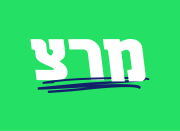
Back Meretz ALS حزب ميرتس Arabic حزب ميرتس ARZ Мерец Bulgarian Nou Moviment - Mérets Catalan Merec Czech Meretz German Meretz Esperanto Meretz Spanish میرتس Persian
Meretz מרצ | |
|---|---|
 | |
| Founders | Shulamit Aloni Yair Tzaban Amnon Rubinstein |
| Founded | 1992 (alliance) 1997 (single party) |
| Dissolved | 12 July 2024 (de facto) |
| Merger of | Ratz Mapam Shinui |
| Merged into | The Democrats |
| Headquarters | Tel Aviv |
| Youth wing | Meretz Youth |
| Ideology | |
| Political position | Left-wing |
| National affiliation | Democratic Union (2019–2020) Labor-Gesher-Meretz (2020) |
| European affiliation | Party of European Socialists (observer)[3] |
| International affiliation | Progressive Alliance[4] Socialist International[5] |
| Colours | Green |
| Most MKs | 12 (1992–1996) |
| Fewest MKs | 0 (2022–2024) |
| Election symbol | |
| מרצ مرص [6] | |
| Party flag | |
 | |
| Website | |
| meretz | |
Meretz (Hebrew: מֶרֶצ, lit. 'Vigour',[7] Arabic: ميرتس)[8] was a left-wing political party in Israel. The party was formed in 1992 by the merger of Ratz, Mapam and Shinui, and was at its peak between 1992 and 1996 when it had 12 seats. It had no seats in the Knesset following its failure to pass the electoral threshold in the 2022 elections, the only time it failed to win seats in the Knesset.
Meretz was a social-democratic and secular party emphasising a two-state solution to the Israeli–Palestinian conflict, social justice, human rights (especially for religious, ethnic and sexual minorities), religious freedom and environmentalism.[9] The party was a member of the Progressive Alliance and Socialist International, and was an observer member of the Party of European Socialists. The party's position on Zionism was disputed.[10][11]
On 30 June 2024 the party agreed to merge with the Israeli Labor Party to form a new party, the Democrats. Under the merger agreement, there will be one Meretz representative in every four spots on the new party's electoral list as well as on the party bodies, and there will also be representation for Meretz's municipal factions.[12] The agreement was ratified at a convention of delegates from both Meretz and Labor on 12 July 2024. Under the agreement, Meretz and Labor continue as separate corporate and budgetary entities, and their factions in the Histadrut, municipal councils and other bodies outside the Knesset will not be unified at this stage but will cooperate.[13]
- ^ Gideon Doron; Michael Harris (2000). Public Policy and Electoral Reform: The Case of Israel. Lexington Books. p. 82. ISBN 978-0-7391-0134-6. Retrieved 16 June 2015.
- ^ Ishaan Tharoor (14 March 2015). "A guide to the political parties battling for Israel's future". The Washington Post. Retrieved 28 June 2015.
- ^ "Members". Party of European Socialists (PES). Archived from the original on 24 July 2015. Retrieved 16 June 2015.
- ^ "Participants". Progressive Alliance. Retrieved 16 June 2015.
- ^ "Member Parties of the Socialist International". Socialist International. Retrieved 16 June 2015.
- ^ "מרצ – השמאל של ישראל". Central Election Committee for the Knesset (in Hebrew). Retrieved 14 June 2021.
- ^ Meretz (Vigour) Times of Israel
- ^ إسرائيل, راؤول ووتليف وطاقم تايمز أوف. "حزب ميرتس وإيهود باراك، والمنشقة عن حزب العمل ستاف شافير يعلنون عن قائمة جديدة مشتركة". تايمز أوف إسرائيل. Retrieved 12 September 2020.
- ^ "Meretz". Ynetnews. 4 February 2008. Retrieved 16 June 2015.
- ^ "Meretz, Once the Beating Heart of the Israeli Left, No Longer Considers Itself a Zionist Party". Tablet Magazine. 3 November 2017.
Late last month, news broke in Israel that the party had deleted any reference to Zionism from its platform, perhaps as early as 2009. Subsequent attempts by reporters to ascertain whether the party still considers itself Zionist—the very question would've seemed absurd to any of us young political animals in the early 1990s—revealed organizational and ideological chaos. The party's head, Zehava Galon, said Meretz remained as committed as ever to Zionism. Her spokeswoman, May Ossi, said the exact opposite: 'Meretz,' she told Haaretz, 'is a non-Zionist Israeli political party, the party of all citizens because the very idea of Zionism necessarily erases an entire other people.' Mossi Raz, the party's secretary-general, claimed that Meretz had never defined itself as a Zionist party
- ^ "Meretz: The Little Post-Zionist Party that Couldn't?". Partners for Progressive Israel. 1 December 2022.
The reactions issued by various senior Meretz figures were inconsistent. Here's a sample: 'Meretz is a non-Zionist Israeli party belonging to all citizens;' 'Meretz is Zionist, while it has non-Zionist members;' 'Meretz has never been defined as a Zionist party;' 'We are an integral part of the Zionist system;' and 'Meretz is a Zionist left party, an Israeli party with Jewish and Arab members.'
- ^ "Meretz, Labor Party sign agreement to merge parties under new party name 'The Democrats'". The Jerusalem Post. 30 June 2024. Retrieved 30 June 2024.
- ^ Shalev, Tal (12 July 2024). "With an overwhelming majority, Meretz and Labor approve merge, becoming the Democrats". The Jerusalem Post. Retrieved 12 July 2024.